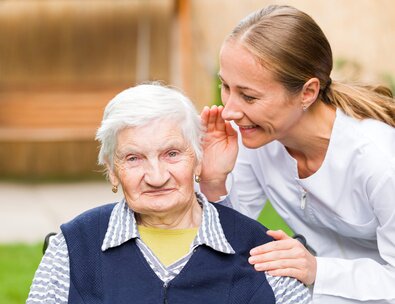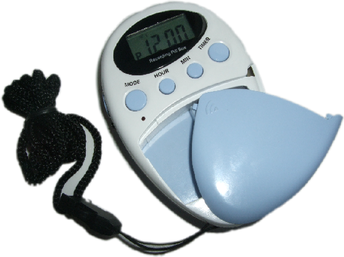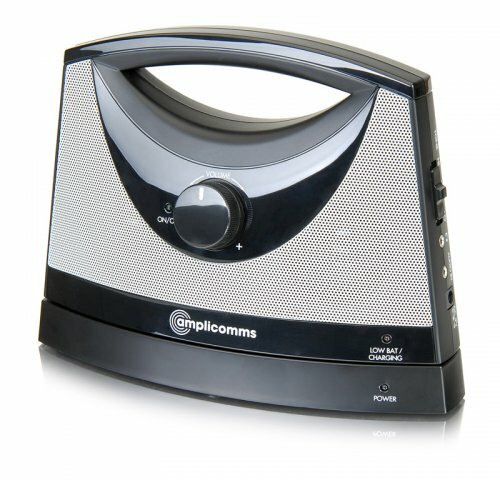When to Step In: Caring for Elderly Parents or Relatives
- Details
When your parents or relatives are getting older, it’s difficult to know when you should become more involved in their care. Many people want to continue living independently in their own homes for as long as possible, and this can often be supported by those who are involved in their care, but it’s often hard to know when your parent or relative needs more care or assistance than they have been used to.
Staying in touch is a very important way to keep track of your elderly parent or relative’s needs, and you can do this easily with a big button mobile phone that is designed specifically for this purpose. Enabling you to stay in contact as well as prevent the loneliness and isolation that is too often a side effect of old age, this is a great way to look out for the wellbeing of those you are concerned about.

Signs to Look For When Considering Care for the Elderly
1. Physical difficulties. Mobility often becomes limited as people age, and when you notice that your elderly parent or relative is finding it hard to get in and out of chairs, or experiencing a lot of joint or muscle pain, this can be a good time to discuss this problem. Simply moving furniture around or rearranging the home to make life easier can remedy some mobility issues. Walking frames or canes can help to enable elderly people to maintain their independence for longer.
2. Medical problems. Older people often develop problems such as diabetes or other conditions needing medication, and this can be hard to regulate when people have difficulty with remembering doses, for example. There are many devices that can help with this issue, as well as other problems caused by memory loss, such as talking pillbox reminders and reminder watches.
3. Poor appetite. If your elderly parent or relative has lost weight, isn’t cooking or isn’t eating proper meals anymore, you need to be observant in case of dehydration or weakness. You may be able to discuss the use of a meal delivery service or a carer who will provide food if you think that the problem results from a difficulty with cooking or preparing food.
4. Poor hygiene. Being uninterested in their physical appearance can be a sign that an elderly person is struggling with depression or Alzheimer’s. It could also demonstrate an inability to physically dress or wash themselves, and it’s important to address this problem quickly to prevent illness or low feelings from taking hold.
5. Mental health problems. If you notice that your elderly relative or parent is acting unusually, doing odd things or acting in an angry or paranoid manner, this may be a sign of dementia or Alzheimer’s. It’s important to seek medical advice from your doctor as soon as possible to get all the help that is available. If you are worried that elderly relatives will wander away from a safe area and put themselves at risk, it’s worth considering a wander alarm to give you both peace of mind.
Find Communication Devices for connecting those who care
For help and advice, as well as all the care products you need to support your elderly parent or loved one, contact HomeCare Technologies online today or call 1890 344 344 (Ireland) or (00)353 214 214 925 (outside Ireland).
Does Someone You Love Have Hearing Loss?
- Details
When someone develops a problem with their hearing, it’s often those closest to them who notice first, and if you suspect that someone you love is struggling with hearing loss, it’s important to talk to them about it as soon as possible. Age related hearing loss is very common, and there are many ways to ease the problems associated with the condition, but tackling it early on is the key to success. Hearing loss can be a contributing factor in dementia and depression, since the areas of the brain that are involved in auditory processing are liable to shrink when they are not stimulated by effective hearing. However, studies show that this damage is reversible when hearing aids are used to restore hearing, and that the earlier this happens, the more effective it can be.

Recognizing When Someone is Hard of Hearing:
It is quite common to notice the following symptoms in a relative or friend who is experiencing difficulties with their hearing. Does someone close to you do any of the following?
• Find it harder to hear higher pitched voices, such as those of women and children
• Struggle to hear background noises
• Ask you to repeat things often
• Turn the television or radio to a louder volume than normal
• Complain of ringing in the ears
Talk About Hearing Aid Devices
The best thing you can do if you are concerned that a loved one is having trouble with their hearing is to talk to them about the problem directly. Many people are extremely sensitive about the issue, and you will need to tread carefully when addressing this with them. However, it is important to point out your concerns honestly, and you can also highlight the developments in hearing aid technology that have created tiny, discreet digital hearing aids that are highly sensitive and effective. Offering to accompany your relative or friend to an appointment about their hearing can be very helpful if they are worried about what will happen. Having someone to reassure them that this is a really positive step can alleviate concerns and reduce the stress that they are feeling around the issue.
Are You Looking For Products for the Hard of Hearing in Ireland?
There are many products that can help with hearing loss, and sometimes the problem can be as simple as an ear wax blockage. Visiting your doctor or a specialist audiologist is the first step, to find out exactly what is causing problems with hearing and to get started with finding answers. To find the best hearing solutions for yourself or someone you love, talk to HomeCare Technologies now. Browse the catalogue, contact the team online, or call 1890 344 344 (Ireland) or (00)353 214 214 925 (outside Ireland).
- Details
If you’re caring for an elderly parent or relative, it will be vital to ensure that they are safe at home. Whether they live alone or with you, you will need to make sure that the environment is not hazardous and that they can move around as easily as possible and in safety.
There are many challenges associated with growing older, and making changes to the home environment to cope with these is an essential process. Your elderly parent or relative may not appreciate the potential risks to their wellbeing, so it is important to consider the following areas carefully to prevent accidents and injuries.

Five Ways to Keep Your Elderly Relative Safe:
1. Check for hazards. Just as you would assess a room to ensure the safety of a small child, you should do this for any space in which your elderly parent or relative will be spending time. Check for slip hazards, such as rugs and doormats that are not properly secured, electrical wires that could pose a danger or trip risk, and low furniture or tables that could cause an injury or accident. Remove anything that is potentially dangerous, or take measures to reduce the risk such as putting low furniture at the side of the room and covering sharp edges.
2. Use alarms. If you are caring for someone who is likely to wander, for example if they have dementia, or who might try to open windows and doors that would present a risk to their safety, it’s worth investing in wander alarms or alarm mats that alert a carer when a safe boundary is breached or a person has moved or fallen in an unexpected way.
3. Fit safety bars. There are many types of safety bar or rail that can help to prevent falls, giving peace of mind and increased safety to the elderly in the home. Safety rails for the bathroom or stairs, or a safety stool for the shower, can help your elderly parent or relative to feel more independent for longer. Browse the range at HomeCare Technologies here.
4. Keep in touch. It’s important that the elderly always feel able to contact their loved ones, not only to prevent the loneliness and isolation that cause depression but also to summon help in case of a fall or if they require assistance. This Personal Tracker Phone is easy to use and has big button technology and speed dial functions, but also uses GPS to keep track of your loved one in case of an emergency.
Care Products for the Elderly in Ireland
HomeCare Technologies will be happy to help you to find the care products you need for the elderly, and understand the peace of mind that comes from having the right solution for your own situation. Browse online now or use the contact form for specialist advice. Alternatively, call today on 1890 344 344 (Ireland) or (00)353 214 214 925 (outside Ireland) to discuss your situation.
- Details
Caring for an elderly parent can be a demanding role, and it can be especially difficult if your parent has physical or mental health needs. However, there are many useful tips that may help you to cope with the situation and to give you and your parent peace of mind. Whether your elderly parent lives in their own home, in a care facility or with you, he or she will probably need more care and support from you than ever before. Taking the time to get it right will make their life and yours a lot more pleasant, and you’ll know that you’ve done your very best to be a great caregiver.

How to Care for your Elderly Parent
- Respect their independence. Giving up their independence is often the thing that elderly people find hardest, and it’s important to respect this even if it is worrying for you. Personal alarms, such as this panic alarm, or pendant alarms that are ideal if you are concerned about the risk of falling, can help to ease your mind and ensure that your elderly parent feels safe and respected.
- Look for simple solutions. Sometimes it can be easy to overlook simple solutions that will solve practical problems faced by the elderly. For example, this walking cane with built in light and panic alarm could be invaluable in retaining independence while ensuring safety.
- Listen. Sometimes, it’s easy to assume that you know what your elderly parent wants as you can see what you feel will be the best solution for them. However, listening effectively to what your elderly parent is saying can reveal a new understanding of their needs. For example, if you have assumed that they will wish to live with you, yet they actually hope to remain in their own home for as long as possible, an open and honest conversation should enable them to feel heard.
- Create a safe environment. If your parent is at risk of falling or has dementia, you may be worried about them injuring themselves or wandering off. Making their environment safer, for example by removing trip hazards and covering sharp edges, can help to protect them, and using a wander alarm to alert you if they leave a specified safe area can ease your mind, too.
- Get support. A supportive network is invaluable when you’re in the demanding role of caregiver. See if there is a support group in your area for both your parent and yourself, and ensure that you are accessing all the medical and social facilities that are available to you.
Find Professional Care Products for the Elderly
For help and advice, as well as all the care products you need to support your elderly parent or loved one, contact HomeCare Technologies online today or call 1890 344 344 (Ireland) or (00)353 214 214 925 (outside Ireland).
- Details
Age-related hearing loss is very common, and it is normal for hearing to deteriorate as you grow older. However, the days of large, obtrusive hearing aids are long gone, and it’s now possible to restore a good amount of hearing and prevent the problems of dementia and depression that are associated with hearing loss, if the hearing loss is identified at an early stage. Being alert to the signs of hearing loss can prevent difficulty in finding an effective solution and can prevent the effects on the brain that long-term deafness can cause. If you think that you or someone close to you is experiencing the onset of age-related hearing loss, you may notice some of the following symptoms:

Symptoms of Age-Related Hearing Loss:
- Finding it difficult to hear female or children’s voices, which are higher pitched
- Having difficulty hearing background noises
- Struggling to hear others speaking clearly, including on the telephone, and having to ask them to repeat themselves
- Having difficulty distinguishing between ‘s’ and ‘th’ sounds
- Needing to have the television or radio at a louder volume than others
- Ringing in the ears
- Finding it hard to hear in areas that are noisy or hearing some sounds much more loudly than others
If You Suspect Someone is Hearing Impaired
You should consult your doctor if you are concerned about your hearing, or if you are worried about a loved one developing age-related hearing loss, you should encourage them to visit their doctor or an audiologist. If the doctor has ruled out other causes of hearing loss, he or she will diagnose age-related hearing loss and refer you to an audiologist or work with you to find a solution that suits you.
Hearing Aid Devices That Can Help:
Discreet, digital hearing aids are very helpful in restoring a good amount of sound to the hard of hearing, but there are many other products that can help you or someone you love to live with hearing loss
- TV speakers. Suitable for anyone who struggles to hear the television at a normal volume, ideal for increasing the volume to a preferred level for the individual to avoid isolation. Small, discreet and completely wireless.
- Telephone amplifiers. Making it easier to keep in touch with loved ones, this device can increase the volume of your existing telephone and is effective and easy to use.
- Smoke alarms. Simple systems can alleviate worries about escaping from danger and bring peace of mind to the elderly and their caregivers by adding a visual alert, such as a flashing light, or a vibrational feature, such as a pillow shaker, to the usual fire alarm sound signal.
Are You Looking For Products for the Hard of Hearing in Ireland?
To find the best hearing solutions for yourself or someone you love, talk to HomeCare Technologies now. Browse the catalogue online or contact the team online now, or call 1890 344 344 (Ireland) or (00)353 214 214 925 (outside Ireland).
- Details
There’s no denying that technology has developed at a faster rate in the last twenty years than ever before, and this can mean that many older people feel out of touch with the gadgets that are available to them and can be afraid of trying newer products or simply overwhelmed by the options available to them. There are, however, some fantastic and clever uses of technology that can make the lives of older people much easier and more pleasant. If you’re considering exploring the use of new gadgets for yourself or for an elderly relative or friend, you could find that the following ideas give you the independence and peace of mind you’ve been searching for.

Five Ways Technology can Make Life Easier for the Elderly:
1. Smart phones. Many mobile phones are so complex that only the most tech-savvy teenager can find all of their functions. However, this doesn’t mean that you should write off smart phone technology altogether as it can be extremely useful to older people. Models such as this Extra Loud Smart Phone can offer useful features such as voice recognition dialing, big buttons and easy internet access as well as safety functions such as providing reminders for medication and locating the user via GPS. A mobile phone is a vital way to keep in touch with friends and family and avoid the isolation that old age can bring, and a smart phone can make it even easier to keep in touch with those you love.
2. Skype. Skype and FaceTime offer invaluable opportunities to connect with even the most distant friends and family for free. Seeing your loved ones on screen as you catch up can be almost as good as a face-to-face conversation and is especially useful for keeping in touch with children and relatives who live abroad using a smart phone, tablet, laptop or desktop computer.
3. Hearing aid accessories. Hearing aids are no longer bulky and obvious; digital technology has created discreet, sensitive solutions to the problem of hearing loss. Keeping your hearing aid in tip top condition is also easier thanks to the gadgets designed for this purpose, such as the range of hearing aid accessories available here, from HomeCare Technologies.
4. Wireless alarms. When you need to summon help, in case of a fall or when you require assistance, there’s no easier way than a wireless Caregiver Alert System. Designed to work with pagers or mobile phones, via sensitive mats, motion sensors or pendant alarms, these devices can be life-changing for the elderly and their carers.
5. Wander alarms. If you’re caring for someone with Dementia, the wireless technology used in wander alarms will be invaluable to you. Using infrared or GPS technology, you’ll be able to keep your loved one safe by ensuring that you are alerted if they leave a safe area, or by locating their movements via GPS systems. This Personal Tracker Phone uses GPS to keep track of your loved one and can track complete journeys via a website or send location coordinates with a Google mapping link to up to three authorized mobile phones.
Care Products for the Elderly in Ireland
HomeCare Technologies are the experts in care products for the elderly and will be happy to help you to find the right solution for you. Browse online now or use the contact form for specialist advice. Alternatively, call today on 1890 344 344 (Ireland) or (00)353 214 214 925 (outside Ireland) to discuss your situation
- Details
It can be quite a shock to realize that the natural roles have reversed within your family and that you are now caring for your parents. Whether you are caring for one or both parents, and whether you share the load with siblings or shoulder the burden alone, it can feel like a big responsibility that can be stressful and upsetting.
Medical advances and healthier lifestyles mean that people are living longer than ever before. This means that many of us will end up being responsible for making care decisions, or taking on a caring role, for our parents at some stage. Making this as simple and straightforward as possible means that it will be less traumatic, and perhaps even a chance to create a positive and loving dynamic that, although different to your earlier relationship, will be rewarding and fulfilling for you both.

Transitioning into Caring for Your Parent
1. Communicate. Talking to your parents about the decisions and choices that will need to be taken in the future can be very helpful in setting out the expectations and options that may exist. Discussing these things while your parents are mentally and physically well will save a lot of distress at a later stage, since you will have a clear idea of your parent’s views on the issues that they face.
2. Make life easier. If you need to be in touch with your parent on a daily basis and they are still physically well enough to be taking walks or shopping independently, a big button mobile phone with SOS button can be a very useful aid. Convenient to use and light to carry, these are useful for keeping in day-to-day contact as well as for emergency situations.
3. Encourage independence. If your parent is keen to continue living independently for as long as possible, encourage their ability to do so by making the most of products such as pendant alarms. These enable a carer to be summoned immediately in case of a fall or accident, and provide peace of mind and reassurance for your parents and for you.
4. Make care easier. Installing some simple and well-designed devices in your home or wherever your parent is living can be very helpful in enabling them to maintain their independence. A wireless nurse call button, used in conjunction with a caregiver pager, can be placed wherever it is likely to be needed and can give peace of mind to you and your parents at all times.
Care Products for the Elderly in Ireland
For support and advice on making your home environment safer for your elderly parent, call HomeCare Technologies to see which solutions will work best for you. We supply a huge range of products designed specifically to help the elderly to live independently for longer, and we are your local experts in care products. Browse online today or call 1890 344 344 (Ireland) or (00)353 214 214 925 (outside Ireland).
- Details
When you’re caring for an elderly or sick relative, your role may be varied and challenging. Feeling supported by others in the same situation as yourself is vital, and you may find that a support group is helpful. Contacting a national helpline for the specific condition that you are caring for can be a good way to begin to access support, since you can find local groups and online resources that are relevant to you.
The type of carer that you are will influence the way that you access support. If you are caring from a distance, you may find that simple products designed with this situation in mind can help a great deal in alleviating the stress you are under. If you are living with the person you are caring for, or providing constant care, you may need more physical support from others. Here at Home Technologies, we can discuss your situation with you and advise you on the solutions that may suit you.

The Challenges of Caring For The Elderly or Sick
- Medical issues - Depending on the condition that you are caring for, you may be required to give and manage medications, to establish nutrition and exercise regimes, and to help manage symptoms and side effects of both the condition and the treatment. Using systems such as memory reminders or devices such as this Talking Pill Box Timer Reminder, you can make this easier for yourself and promote independence in those you are caring for.
- Emotional difficulties - It’s very hard to see someone you love suffering, especially if they feel that their dignity is being compromised. If you can, remind yourself that the caregiver role is a unique opportunity to renew your relationship with the person you are caring for, to commit to giving them the help and support that they need, and to make a real difference to their quality of life and happiness.
- Practical problems - There are many products that can make your caring role easier, and using these to simplify things will help you to spend more time on the positive aspects of caring and on finding the support you need. For example, bed or chair alarms that can alert you when the person you are caring for tries to get out of their bed or chair are a great way to ensure that the person does not need 24 hour observation.
Products for Caregivers in Ireland
Caring for the elderly or sick is a demanding but vital job, and our products are designed to help to make it easier for you. Finding a good support network and making the most of the available resources can make a big difference to your energy levels and your feelings about your role.
We pride ourselves on our knowledge and understanding of the products we stock, and we’ll always take the time to help you find the right solution for your family. Contact us at Home Technologies today, or call 1890 344 344 (Ireland) or (00)353 214 214 925 (outside Ireland).
- Details
When you’re caring for someone with Dementia, it’s easy to feel lonely and weighed down by the burden. Connecting with others who are in the same situation can really help you to feel better about the situation you are in and ease the pressure you are feeling.
Dementia can be exceptionally debilitating, and it’s very difficult to retain your dignity and live independently as a sufferer. Forging a positive relationship with the person you are caring for will be the most important thing, and using positive techniques will help you to do this. Anything you can do to minimize stress for yourself and for the person you are caring for will be helpful and should be a high priority.

Tips For Caring For Someone With Dementia:
- Use positive body language. Always approach a person with dementia from the front, and walk slowly, to give them time to process the fact that you are approaching. Do not stand directly in front of them, in a confrontational way, but to the side, to show you are there for support. Crouch low if they are seated or in bed, to show that you are not a threat, and offer your hand as a friendly gesture.
- Speak clearly. Address the person you are caring for by their name, as this will be the thing they remember most often. Keep instructions short, simple and clear. Offer simple choices instead of asking yes and no questions, and break things down into easier steps whenever things seem too complicated.
- Use hand under hand. Putting your hand under the hand of someone with dementia can help to guide them in a task. Stimulating their muscle memories can help them to remember how to carry out the task and then you should remove your hands if possible and allow them to complete as much as the task as they can independently.
- Keep things simple. It will be stressful for you and the person you are caring for if you attempt to travel long distances or go to busy, unfamiliar locations. Try to keep routines simple and minimize stress by keeping medication and visits short and only to familiar, quiet locations that are not busy.
- Give yourself peace of mind. Using products that are designed with your situation in mind can ensure that life is much easier for you. A caregiver pager can be a useful aid that can make sure that you are contactable at all times. Explore the different types available here.
- Get Support. Joining a support group can be extremely helpful and allow you to manage your stress and share your worries with other in the same situation. Find out more here.
Are You Caring For Someone With Dementia in Ireland?
If you’re caring for someone with dementia, talk to us to find out how you could make your life easier. We have many products designed to help the elderly and people with dementia with their everyday lives, and we are happy to discuss your situation to ensure you find the right solution for you. Contact HomeCare Technologies online today or call 1890 344 344 (Ireland) or (00)353 214 214 925 (outside Ireland).
- Details
When you or a loved one is experiencing hearing loss, it can be extremely worrying and isolating. Being excluded from conversations, finding yourself unable to follow television programmes or films and worrying about missing emergency signals such as alarms can be upsetting and can cause many problems in daily life that might seem surprising.
People often don’t realize the extent to which hearing loss can be debilitating. Someone who has never experienced hearing loss or come into close contact with it may struggle to understand the impact it can have on everyday tasks and situations. There are many products available to help with this problem, and it’s a good idea to talk to the experts in order to find the right solutions for you.

What Can I Do To Help When Someone is Deaf or Hearing Impaired?
- Understand the problem. Understanding the difficulties the hard of hearing have is a very important part of helping someone with the condition. Once you know what sort of hearing loss a person suffers from, and which sounds or situations they struggle with the most, you can help in a more meaningful way. For example, feeling excluded from conversations can be improved a great deal if people face the person with hearing loss and ensure that they are speaking clearly.
- Look for practical solutions. Sometimes a problem can be alleviated quickly and easily using a simple device that is designed for this purpose. A TV Sound Box, for example, can solve the problem of not being able to hear the television clearly when watching at an acceptable volume for others.
- Keep in touch. People with hearing loss are often afraid of losing touch with those they love, especially when they find it difficult to communicate using the telephone. An easy to use, adapted mobile phone can help those who are hard of hearing to continue conversing with their loved ones as usual and minimize the likelihood of isolation.
- Prioritise Safety. It can be very frightening to know that you would struggle to hear a smoke alarm or siren, and this is a problem that is very easy to solve. Extra loud smoke alarms, and systems that can be programmed to set off a vibrational alarm in times of danger, are available and will help to set your mind at ease immediately.
Where Can I Get Hard of Hearing Products in Ireland?
HomeCare Technologies are the experts in care products for all the family and will be happy to help you to find the right solution for you. Browse online now or use the contact form for specialist advice. Alternatively, call today on 1890 344 344 (Ireland) or (00)353 214 214 925 (outside Ireland) to discuss your situation.
December Newsletter
- Details
|
|
December News & Updates
|
|
The season of good will has arrived and it is a perfect opportunity to drop in on a neighbour or loved one. Keep in Contact, Hearing Aid Maintenance, How Do They Predict Cold Winters? |
|
homecaretechnologies.ie |
|
Christmas is on the way
Yes it's that time of year again when we all get caught up in the spirit of the season. Making and checking our lists of what we need to get and do to make the 25th a day to remember for our families . This year why not put a little time on your list, maybe half an hour once or twice a week to drop into an elderly neighbour to have a cup of tea and see that everything is alright. These few minutes may be the only time they will spend with another person that day especially if the weather is poor and it is a good opportunity to make sure everything is ok such as if the heating is working and being used. Remember to ask if they need anything from the shops or a little help around the house little things make a big difference. |
|
|
Get Connected & Keep in Touch
We all have days when the world seems to be out to get us and nothing is going right. Ever notice how a phone call or message from a friend picks you up. At Homecare Technologies we have a great range of mobile phones for everyone. From straight forward easy to use big button mobile phones to easy to use smart phones.
All our mobile phones will work on any network all you need is the SIM card either from an existing phone or they can be easily gotten from any network provider.
We also have a great range of Home Phones and Phone Accessories
Remember we offer a 30 day money back guarantee just keep the box and packaging until you are sure.
Call us today and we will be happy to help you choose the best one for you. 021 4214 925
Click Here to see our Phones
________________________________________________________________________________ |
|
Hearing Aid Maintenance made easy
Hearing Aids are becoming more and more common these days and thankfully the social stigma is being removed. We offer a great line of Hearing Aid accessories for maintaining your hearing aids to prevent ear irritation and to make cleaning as easy as possible for optimum comfort and effectiveness.
Call us today and we will be happy to help 021 4214 925
Click Here to see our Hearing Aid Accessories
|
|
|
|
'Yes, it is going to be a cold winter,' the meteorological officer told the chief. Consequently, he went back to his tribe and told the men to collect plenty of firewood.
fortnight later the chief called the Weather Service and asked for an update. 'Are you still forecasting a cold winter?' he asked.
'Yes, very cold', the weather officer told him.
As a result of this brief conversation the chief went back to the tribe and told his people to collect every bit of wood they could find.
A month later the chief called the National Weather Service once more and asked about the coming winter. 'Yes,' he was told, 'it is going to be one of the coldest winters ever.'
'How can you be so sure?' the chief asked.
The weatherman replied: 'Because the Native Americans of the Great Lakes are collecting wood like crazy.'
Visit Homecare Technologies for all our latest products and news
email info@homecaretechnologies.ie
Call 021 4214 925
Page 1 of 6






